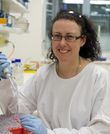
Dr Odilia Wijburg
Department of Microbiology and Immunology
University of Melbourne
odilia@unimelb.edu.au
Research Activities
The research in our laboratory focuses on bacterial pathogenesis and immunobiology of mucosal bacterial pathogens and can be broadly divided in 3 major areas:1. The function of secretory antibodies in protection of the mucosal surfaces against infection and inflammation.
2. The bacterial products and strategies that allow the organism to avoid being destroyed by the mammalian immune system.
3. The types of immune responses that can circumvent these strategies and products.
We work with a range of pathogens using a range of in vivo and in vitro model systems:
Salmonella typhimurium is an intracellular bacterium that replicates with macrophages. We are currently examining how the bacterium can persist inside cells like macrophages and the metabolic processes the bacterium uses to facilitate intracellular replication; Our experience in manipulating Salmonella and its use in vaccination against Salmonella disease, and as a 'vector' for vaccination against unrelated pathogens, has been exploited in the search for new human vaccines. Helicobacter pylori infects the stomach of approximately half the world's population. This chronic infection may be asymptomatic or cause gastritis, MALT lymphoma or gastric cancer. We are investigating the nature of the inflammatory response generated against H. pylori, and employing a vaccination model to attempt to understand how a protective immune response can be induced in the stomach. We are also interested in the generalized effects of chronic infection and are investigating the molecular mechanisms by which chronic infection with H. pylori or Chlamydia pneumoniae may pre dispose the development of atherosclerosis.
Streptococcus pneumoniae and influenza virus. Globally, about 3 million deaths annually are due to Streptococcus pneumoniae, a bacterium that causes otitis media, pneumonia, meningitis or bacteremia. Influenza virus infects the tissues of the respiratory tract, which usually results in mild symptoms but can lead to more serious complications such as (viral) pneumonia. However, hospitalisation of especially young children and the elderly suffering from influenza is often necessary to treat secondary bacterial infections causing pneumonia. We have developed adult and suckling mouse models of these diseases to investigate transmission and immune responses to infection.
Secretory antibodies in protection against infection. Most text books state that the major role of secretory antibodies is to protect the mucosal surfaces of the body against pathogens. However, a large number of studies have failed to demonstrate reduced resistance against infection in the absence of secretory antibodies. Rather, we hypothesise that the constitutive secretion of large amounts of ‘polyreactive’ secretory antibodies serves to eliminate antigens, including commensal flora, food and other environmental antigens, from the mucosal epithelium to prevent unwanted, systemic immune responses to these antigens. Current research projects focus on the altered immune homeostasis observed in mice that cannot secrete antibodies as a result of a mutation in the polymeric Ig receptor.
Techniques/Expertise
Wide range of mouse models of infectious diseases, including transgenic and knockout mouse modelsImmunological techniques: flow cytometry, ELISA, ELISpot, cytokines, T cell assays
Histology and immunohistochemistry
In vitro infection models and assays (macrophages and epithelial cell lines)
Collaborations
Prof. Richard Strugnell, Dept. Microbiology and Immunology, The University of MelbourneDr. Anna Walduck, Dept. Microbiology and Immunology, The University of Melbourne
Prof. Lorena Brown, Dept. Microbiology and Immunology, The University of Melbourne
Prof. Roy Curtiss III, The Biodesign Institute, Arizona State University, AZ, USA
Dr. David Briles, Dept. Microbiology at The University of Alabama, Birmingham, AL, USA
Dr. Nico van Rooijen, Dept. Cell Biology and Immunology, Free University, Amsterdam, The Netherlands
Dr Patrick Reading
Dr Tom Brodnicki
Disease Models
Streptococcus pneumoniae: colonisation, invasive disease, transmissionSalmonella typhimurium: oral and systemic infection models, transmission
Listeria monocytogenes: systemic infection models
Helicobacter pylori: oral infection model and gastritis
Animal model of secretory antibody deficiency
Genetically Modified Organisms
C57BL/6.pIgR-/- NOD/Lt.pIgR-/-Access to a range of knock out mouse strains for immunological studies
Other Lab Members
Strugnell group lab heads:Prof. Dick Strugnell (rastru@unimelb.edu.au)
Dr. Odilia Wijburg (Odilia@unimelb.edu.au)
Dr. Anna Walduck (awalduck@unimelb.edu.au)
Other personnel:
Post-doc: Dr. James Holden
Students: Kim Simpfendorfer
Nancy Wang
Kirsty Short
Andreas Kupz




































